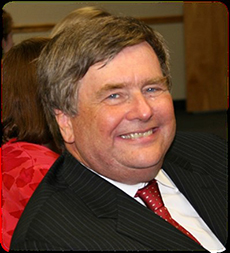In Memoriam: Francis M. Costello
1949-2017
by John Kinneman, CHP, David Allard, CHP, and Kent Lambert, CHP


Francis (Frank) M. Costello of Hatfield, Pennsylvania, passed away peacefully on Sunday, 26 March 2017, at his home with his loving wife, Wanda, and family by his side. Later that week, there was a gathering of Frank's family and an outpouring of emotion from many close friends and colleagues at Saint Stanislaus Church in Lansdale, Pennsylvania, for his service and burial. Those who knew Frank and his great (dry) sense of humor and love of sports were not surprised to see him during the viewing dressed in his favorite Philly's baseball uniform. Frank was a notorious "Philly Fanatic!"
Born 9 January 1949 in Philadelphia, Frank was the son of the late Francis J. and the late Corinne Costello. In addition to Wanda, Fran (as he was known to family) is survived by his loving children, Michael R. Costello and Mary Frances Bucciarelli; his sister, Elizabeth Robinson; and his beloved grandchildren, Kayleigh, Aislynn, Chase, and Dylan.
Frank attended Saint Joseph's Preparatory School in Philadelphia and graduated in 1970 from Saint Joseph's University, where he received a bachelor of science degree in engineering physics. In 1973, he graduated from Rutgers University with a master's degree in health physics and obtained comprehensive certification in health physics in 1977. In 1981, he received a second master's degree in business administration from Temple University.
Frank began his professional career in the early 1970s as an accelerator health physicist at Brookhaven National Laboratory and then took a health physicist position with Delmarva Power in Wilmington, Delaware. In 1977, Frank joined the then relatively new U.S. Nuclear Regulatory Commission (NRC) as an inspector in Region I.
Frank responded to the reactor accident at Three Mile Island and was an active participant in the environmental monitoring program. As one of the many actions following the accident, he provided technical leadership in the development and operation of the NRC Thermoluminescent Dosimeter Environmental Radiation Monitoring Network, a national monitoring program.
Over his 30-year career with NRC, Frank worked on a wide variety of projects as an individual technical contributor, team leader, mentor, and manager. Early in his career he developed the technical basis and provided court testimony that resulted in the conviction of a senior licensee manager for intentionally creating significant safety hazards for employees. He investigated a number of significant radiation exposures, conducted complex calculations, and identified the root causes of the exposures.
While his technical skills were strong, his "people skills" and intuition for how best to work with individuals and organizations were even stronger. In addition, he was frequently called on to emcee meetings, retirements, and other functions where he demonstrated his humor, his infectious laugh, and his performance abilities. Throughout his career, Frank gained the respect and affection of his coworkers and the regulated community.
As a result of his leadership abilities, he was promoted at NRC to branch chief and then deputy division director before his retirement in 2007. Frank's talents and contributions were recognized by the NRC Meritorious Service Award in 1989. The award stated that his ". . . ability to identify safety violations, extract the root cause . . . and negotiate . . . corrective action reflect his breadth of knowledge as well as his interpersonal skills. He has distinguished himself through his success in the development of other employees into excellent performers." In 2004, the NRC recognized his continued contributions with the Distinguished Service Award and cited, among other talents, his ". . . exceptional ability to build coalitions and communicate effectively with external stakeholders."
Upon Frank's passing, NRC posted on its internal web page, ". . . the agency is saddened to learn of Frank's passing . . . he was a colleague, friend to many, and will be remembered for his infectious humor, kindness, and optimism."
Given his passion for health physics, Frank joined the Pennsylvania Department of Environmental Protection's (PADEP) Bureau of Radiation Protection (BRP) soon after his retirement from NRC. As Dave Allard notes, "I've known Frank for over 35 years, and he joined us at a perfect time when we had just become an NRC agreement state. His in-depth experience in health physics and inspection procedures was a huge asset to the staff and program. He often kidded me that this was his 'retirement charity work'!"
In reality, Frank enjoyed the variety of health physics challenges in his nearly 10 years of work for the Commonwealth. His ability to mentor staff was unparalleled; the professionalism he instilled in less experienced inspectors will be felt for years to come. Because of his experience, he often found himself as the lead investigator for medical events in the Philadelphia area. Frank also assisted BRP and other agreement states with the transition from radioactive materials increased controls security orders to the new NRC 10 CFR 37 security rule and chaired the national effort by the Conference of Radiation Control Program Directors' (CRCPD) work group that crafted the associated model state regulation, SSR Part V.
In 2014, Frank was nominated and appointed the Organization of Agreement States' (OAS) representative to the NRC's Advisory Committee on the Medical Uses of Isotopes (ACMUI). He loved the ACMUI work and addressing high-profile national policy issues. Frank often presented his analyses at OAS, CRCPD, and Health Physics Society (HPS) meetings on the many challenging issues faced by the NRC, agreement states, and health physics community.
Frank was active in the Delaware Valley Society for Radiation Safety (DVSRS), the HPS local chapter, and was the president of DVSRS in 2011–2012. More importantly, Frank had the respect of the regulated community. His in-depth knowledge of the regulations and health physics along with his innate common sense and wry sense of humor allowed him to work with licensees in a collaborative manner. This often meant that issues could be resolved without resorting to use of the regulatory "stick," e.g., a notice of violation. However, when warranted, he would issue a citation.
Frank will always be remembered as a loving husband, father, grandfather, and brother, as well as a wonderful friend, colleague, and storyteller—who was not with us long enough.




